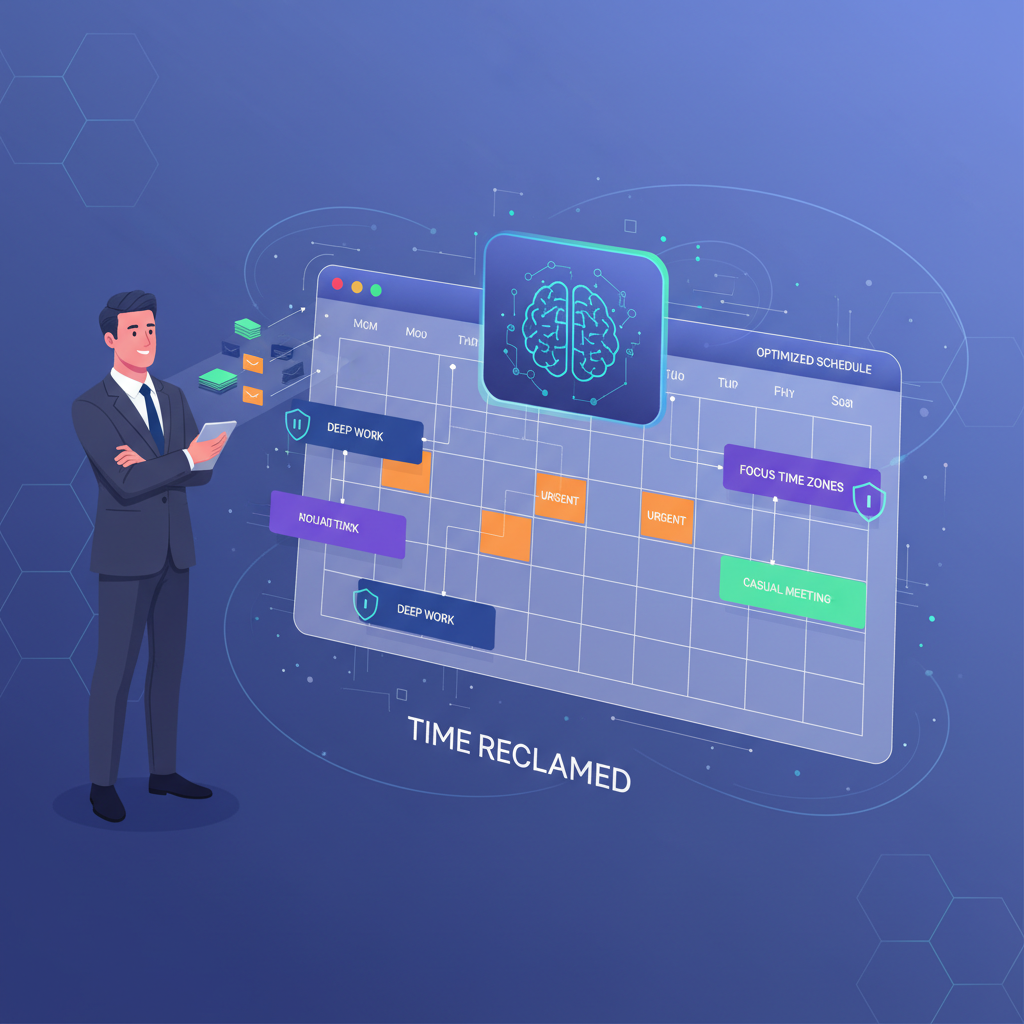
Frameworks, core principles and top case studies for SaaS pricing, learnt and refined over 28+ years of SaaS-monetization experience.
Thank you! Your submission has been received!
Oops! Something went wrong while submitting the form.
Join companies like Zoom, DocuSign, and Twilio using our systematic pricing approach to increase revenue by 12-40% year-over-year.

In today's fast-paced business environment, executives and professionals are constantly battling the clock. Meeting requests flood inboxes, coordination across time zones becomes a puzzle, and finding the perfect time slot feels like searching for a needle in a haystack. This is where calendar management AI steps in as a game-changer, transforming how we organize our professional lives through intelligent scheduling capabilities.
Calendar management has evolved dramatically—from paper planners to digital calendars, and now to AI-powered scheduling intelligence. This progression represents more than just technological advancement; it's a fundamental shift in how we approach time as a resource.
Traditional digital calendars solved the accessibility problem but still required significant manual input. Users needed to evaluate availability, prioritize appointments, and make decisions about time allocation. The cognitive load remained substantial, especially for executives juggling dozens of meeting requests daily.
Calendar management AI distinguishes itself through agentic capabilities—meaning it can act autonomously on your behalf while aligning with your preferences and priorities. Unlike basic automation tools that follow rigid rules, scheduling intelligence systems can:
According to research from Accenture, professionals who use AI calendar assistants save an average of 3.5 hours weekly—time previously spent on scheduling coordination and calendar management tasks.
Modern calendar automation systems learn your working style. Do you prefer meetings clustered in the morning? Need focus time in the afternoons? Block Fridays for deep work? The AI develops a preference profile based on your patterns and explicit instructions, then applies these preferences when scheduling.
A Harvard Business Review study found that executives with well-defined calendar boundaries report 27% higher productivity scores than those with fragmented schedules. AI calendar management helps enforce these boundaries automatically.
Not all meetings deserve equal time. Scheduling intelligence can determine appropriate durations based on:
For example, your AI might suggest 25-minute meetings instead of 30, creating natural buffers between appointments—a technique adopted by 64% of Fortune 500 executives according to a recent McKinsey survey.
Perhaps the most powerful aspect of calendar management AI is the ability to negotiate with other calendars—whether those belong to humans or other AI agents. This creates a network effect where scheduling becomes exponentially easier as more participants use agentic systems.
When two AI scheduling assistants interact, they can find optimal meeting times in seconds by evaluating each principal's:
Advanced calendar management AI extends beyond simply filling slots in a calendar. Today's systems focus on comprehensive time optimization by considering:
Knowledge workers require uninterrupted blocks for deep concentration. AI agents can actively protect these periods by:
Research from the University of California shows that it takes an average of 23 minutes to fully refocus after a significant interruption. Smart calendar management reduces this cost by:
Not all hours in your day are equally productive. Calendar intelligence systems now consider your energy patterns, scheduling high-concentration tasks during your peak performance times and reserving lower-energy periods for less demanding activities.
While the benefits of calendar management AI are substantial, implementation comes with considerations:
For maximum effectiveness, scheduling intelligence needs access to multiple systems:
Calendar data reveals sensitive business information. When evaluating calendar automation solutions, security protocols and data handling policies should be primary considerations.
Users typically experience a 2-3 week adjustment period while the AI learns their preferences. During this phase, it's important to provide feedback and corrections to improve the system's accuracy.
The next frontier in calendar management AI includes:
Effective calendar management is no longer just about finding open slots—it's about strategic time allocation aligned with priorities and productivity patterns. Calendar management AI represents a shift from reactive scheduling to proactive time optimization.
For executives and professionals drowning in meeting requests, scheduling intelligence offers more than convenience; it provides a competitive advantage through better time utilization. As these systems continue to evolve, the question becomes less about whether to adopt AI-powered calendar management, and more about how to maximize its strategic benefits in your workflow.
The most valuable resource in business isn't information or capital—it's time. And intelligent scheduling is proving to be one of the most effective ways to reclaim it.

Join companies like Zoom, DocuSign, and Twilio using our systematic pricing approach to increase revenue by 12-40% year-over-year.